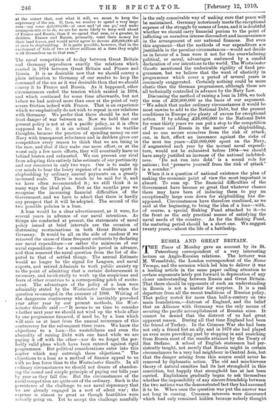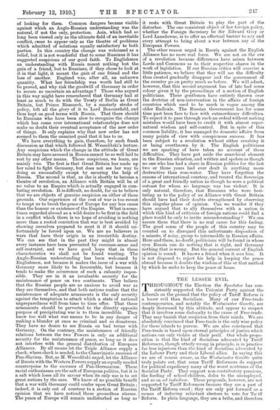RUSSIA AND GREAT BRITAIN. T HE Times of Monday gave an
account by its St. Petersburg correspondent of a very interesting lecture on Anglo-Russian relations. The lecturer was M. Wesselitski, the London correspondent of the Novoe Vremya, and the occasion which led. him to deliver it was a leading article in the same paper calling attention to certain arguments lately put forward in deprecation of any closer understanding between Russia and Great Britain. That there should be opponents of such an understanding in Russia is not a matter for surprise. It is a real departure from all the recent traditions of Russian policy. That policy rested for more than half-a-century on two main foundations,—distrust of England, and the belief that an Alliance with Germany was the only means of securing the pacific accomplishment of Russian aims. It cannot be denied that the distrust of us had great apparent reason. During all that time England had been the friend of Turkey. In the Crimean War she had been not only a friend but an ally, and in 1878 she had played an even more provoking. part by stepping in and snatching from Russia most of the results attained by the Treaty of San Stefano. A school of English statesmen had per- sistently taught, not merely that Russia might in certain circumstances be a very bad neighbour in Central Asia, but that the danger arising from this source could never be removed by diplomatic action. The old and mischievous theory of natural enmities had its last stronghold in this conviction, but happily that stronghold has at last been carried. Englishmen gradually began to ask themselves whether the impossibility of any sincere friendship between the two nations was the demonstrated fact they had assumed it to be. When once the question was put the answer was not long in coming. Common interests were discovered which had only remained hidden because nobody thought of looking for them. Common dangers became visible against which an Anglo-Russian understanding was the natural, if not the only, protection. Asia, which had so long been viewed only as the ultimate field of an inevitable conflict, came to appear only as the theatre of problems which admitted of solutions equally satisfactory to both parties. In this country the change was welcomed as a relief, but it is not wonderful that to some Russians it has suggested suspicions of our good faith. To Englishmen an understanding with Russia meant nothing but the gain of a friend, but to Russians, if they chose to look at it in that light, it meant the gain of one friend and the loss of another. England was, after all, an unknown quantity. What her friendship was worth had still to be proved, and why risk the goodwill of Germany in order to secure so uncertain an advantage ? Those who argued in this way might have remembered that Germany had at least as much to do with the Treaty of Berlin as Great Britain, but Prince Bismarck, by a masterly stroke of policy, left all the glory of it to Lord Beaconsfield, and thus kept on good terms with Russia. That there should be Russians who have been slow to recognise the change which has come over international relationships does not make us doubt their eventual acceptance of the new order of things. It only explains why that new order has not seemed to them the unmixed good that it has to us.
We have everything to gain, therefore, by such frank discussion as that which followed M. Wesselitski's lecture. Any suspicions which the change in the attitude of Great Britain may have aroused in Russia cannot be so well laid to rest by any other means. Those suspicions, we learn, are mainly two. The first is that Great Britain has made up her mind to fight Germany, but does not see her way to doing so successfully except by securing the help of Russia. The second is that, as she is shortly to become a theatre of revolution, an Alliance with Britain will be of no value to an Empire which is actually engaged in com- bating revolution. It is difficult, no doubt, for us to believe that we are objects of genuine suspicion on either of these grounds. Our experience of the cost of war is too recent to tempt us to break the peace of Europe for any less cause than the honour or existence of the Empire. What is some- times regarded abroad as a wild desire to be first in the field in a conflict which there is no hope of avoiding is nothing more than a rooted conviction that war is best avoided by showing ourselves prepared to meet it if it should un- fortunately be forced upon us. We are no believers in wars that have their origin in an irresistible destiny. We can see that in the past they might in almost every instance have been prevented by common-sense and self-restraint, and we have good hope that in these characteristics we shall not be found wanting. The Anglo-Russian understanding has been welcomed by Englishmen, not because it makes the issue of a war with Germany more likely to be favourable, but because it tends to make the occurrence of such a calamity impos- sible. They see in it an invaluable security for the maintenance of peace on two continents. They believe that the Russian people are as anxious to avoid war as they are themselves, and that both nations realise that the maintenance of adequate armaments is the only security against the temptation to attack which a state of national unpreparedness will from time to time offer. That these armaments should be perverted to the directly opposite purpose of precipitating war is to them incredible. They know too well what war means to be in any danger of making a blunder at once so criminal and so disastrous. They have no desire to see Russia on bad terms with Germany. On the contrary, the maintenance of friendly relations between the two Powers is only an additional security for the maintenance of peace, so long as it does not interfere with the general distribution of European Alliances. By all means let the Triple Affiance supply a check, where check is needed, to the Chauvinistic excesses of Pan-Slavism. But, as M. Wesselitski urged, let the Alliance of Russia with the Western Powers supply an equally needed counterpoise to the excesses of Pan-Germanism. These racial enthusiasms are the salt of European politics, but it is a salt which loses all its savour when its only use is to set great nations by the ears. We know of no possible benefit that a war with Germany could confer upon Great Britain ; indeed, it is only out of courtesy to a section of Russian opinion that we have noticed these groundless alarms. The peace of Europe will remain undisturbed so long as it rests with Great Britain to play the part of the disturber. The one consistent object of her foreign policy, whether the Foreign Secretary be Sir Edward Grey or Lord Lansdowne, is to offer an effectual barrier to any and every attempt to bring about a war between any of the European Powers.
The other reason urged in Russia against the English Alliance has no more real force. We are not on the eve of a revolution because differences have arisen between Lords and Commons as to their respective shares in the work of legislation. If our Russian critics will exercise a little patience, we believe that they will see the difficulty thus created gradually disappear and the government of the country go on pretty much as before. We will admit, however, that this second argument has of late had some colour given it by the proceedings of a section of English politicians. These gentlemen have entirely thrown over the doctrine of non-intervention in the affairs of foreign countries which used to be much in vogue among the older Radicals. The Russian Government has for some time past been face to face with extraordinary difficulties. To expect it to pass through such an ordeal without making mistakes would have been to credit it with almost super- natural wisdom and self-control. But in spite of this common liability, it has managed its domestic affairs from many points of view with conspicuous success. It has been subject to a revolution without either crushing it or being overthrown by it. The English politicians we are speaking of have taken no account of these difficulties. They have put aside the anarchical element in the Russian situation, and written and spoken as though no one who has had a share in Russian politics for the last two or three years had ever dealt in anything more destructive than rose-water. They have forgotten the canons of international courtesy, and treated the Sovereign of a great and friendly nation as though he were a political outcast for whom no language was too violent. It is only natural, therefore, that Russians who were hesi- tating as to the policy of an Alliance with Great Britain should have had their doubts strengthened by observing this singular phase of opinion. Can we wonder if they have argued that to ally themselves with a nation in which this kind of criticism of foreign nations could find a place would be only to invite misunderstanding ? We can assure them that there is no real cause for this feeling. The good sense of the people of this country may be counted on to disregard this unfortunate disposition of a minute, if noisy, group to intermeddle in Russian affairs. Here and there, no doubt, politicians will be found in whose eyes Russia can do nothing that is right, said Germany nothing that is wrong. But the general current of English opinion is sound. It knows a friend when it sees him. It is not disposed to reject his help in keeping the peace abroad because it doubts the wisdom of this or that method by which he seeks to keep the peace at home.











































 Previous page
Previous page